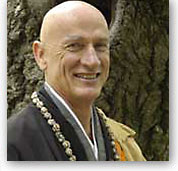 In anticipation of the evening with Jun Po Denis Kelly Roshi in Amsterdam, October 10 2015, I interviewed Jun Po via Skype. Jun Po Denis Kelly received his Zen Masters recognition in 1992. He was Vice Abbot and head monk as well as resident yoga teacher at Dai Bosatsu Zendo Kong Ji in the Catskill Mountains in New York state from 1987 through 1993. His Inka Zen lineage is in the Rinzai tradition, through Eido Shimano Roshi of the The Zen Studies Society. Jun Po has been practicing, studying and teaching Zen and Yoga for over twenty-five years.
In anticipation of the evening with Jun Po Denis Kelly Roshi in Amsterdam, October 10 2015, I interviewed Jun Po via Skype. Jun Po Denis Kelly received his Zen Masters recognition in 1992. He was Vice Abbot and head monk as well as resident yoga teacher at Dai Bosatsu Zendo Kong Ji in the Catskill Mountains in New York state from 1987 through 1993. His Inka Zen lineage is in the Rinzai tradition, through Eido Shimano Roshi of the The Zen Studies Society. Jun Po has been practicing, studying and teaching Zen and Yoga for over twenty-five years.
Heleen: Jun Po, we are going to discuss the importance of spiritual awareness and meditation for corporate leaders. Could you please introduce yourself? Why are you the person that can tell us about that, about spiritual awareness and meditation?
Jun Po: I trained a long time. I selected Buddhism as a vehicle for awakening and conscious enlightenment and trained for a long time. I never intended to become a recognized teacher, you might say, but evolution took its course. I completed my training and was recognized as a certified Zen Master in the Rinzai line.
Then I was supposed to stay, and take the monastery I was training at. I was there seven years. Then I realized I had to come back into our culture, and to, I say, “Dump out the bathwater, but keep the baby.” Take a look into what is this practice? What can it achieve, and how does it help, and where does it help? For me, the most important place is, you could say, Corporate America. For me, in a corporate world, corporations are now the governments, you might say, so if we’re looking at…
“What can this practice achieve in the corporate world?”
Heleen: There’s so much influence.
Jun Po: Yeah, so much influence. Like I say, the religion for the day is imperial capitalism, consumerism, and growth and profit. That’s run amuck a bit. We’re now looking at the devastating affect that it’s had on the environment, for instance, and all the changes that are coming. The great gift and the great beauty but, also, the problems at hand and how do we face them? In a sense, to develop the depth of conscious awareness through discipline and strengthening of will and focus so that you can, in the corporate world, be present. Be compassionately aware and concerned, and function consciously. Not to end it, but modify it.
In Corporate America, there are two insistences that are made. One is growth, and the other is profit. Increase growth and profit. That’s the primary objective. If that doesn’t happen, we punish people by firing them and throwing them out. It’s a system that is perpetuating a lot of pain, and confusion, and destruction, as well as the gifts.
That can be modified. The way to modify it is to sit down. Enter into introspection and meditative concentration practices. Open your heart, and say, “To the greater depth of compassion, it’s there.” Then see what can I do in a corporate setting? How can I function inside the corporation more consciously? There’s a system and a vehicle that allows that if a person’s interested. I think that everyone that’s involved in business today realizes that it would be lovely if we could make some changes.
“How can I function inside the corporation more consciously? I think that everyone that’s involved in business today realizes that it would be lovely if we could make some changes.”
Heleen: You’re talking about focus and discipline when you’re talking about spiritual awareness? To many people, spirituality sounds like obscure, vague, a dreamy kind of thing, so that sounds completely different. Can you say something about that?
Jun Po: Yes. When you take a look at the classical understandings and teaching of the Buddha, it’s a non-theistic spiritual or conscious discipline taking you to a state of awareness and deeper understanding. I would say Buddha was primarily an agnostic philosopher, you might say. He didn’t deal with the idea of deity or life after death, all the things that are coming along now. He taught fundamentally that impermanence is a reality. Everything is changing. That with life comes pain and discomfort, and these are natural, unavoidable reactions to circumstances. That at the truth, at the deepest truth, the self that we have is a temporary construct, and that through discipline and inquiry we can reorganize our mind, our philosophical understanding, our neurolinguistics, and live from a much deeper and more conscious place. He set about that practice and form.
With meditation and practice, what you do is you sit down, take your seat and stop. Go deeper and deeper and deeper into your mind. Don’t run with thoughts. Don’t run with feelings, emotions, and circumstances, so you develop the ability to stay absolutely clearly present and open and, what I say, intelligent in the face of anything.
“Spiritual practice is about focus and discipline”
If you’re in the boardroom and some mess is going on, you’re not subject to reactive patterning. You see the nature of the reactions and the understandings, but your witnessing intelligence is no longer for sale. You no longer are bound to what we call the hysterical-historical or reactive patterning. You see that dissent is a condition to responses, but no one has ever made you react in a particular way except your own conditioning. Suddenly, your depth of witnessing intelligence is stronger than your emotional reactivity. But the first thing you would have to do is come to that depth.
Heleen: You have a very down-to-earth method for that, don’t you?
Jun Po: Yeah. We have a process called a Mondo Zen dialect or dialogue process. In our tradition we’ve used kōans to focus the mind, the questions. These questions then will take you into deeper, deeper witnessing, deeper, deeper witnessing. Through the dialogue questioning, we start a process of inquiring into the deeper nature of mind. In an intersubjective situation where we’re sharing that, what happens is in the dialogue, I’m presenting one view. You have another view. The views rub into each other. Because of that sharing, there’s the possibility of mutually sharing the deeper consciousness. Then establishing the understanding of what that is and how it is, and that, in fact, recognizing that this depth of witnessing is within you.
Then we also say, “From this depth.” Then we describe it. Take it apart. What is this witnessing like? Finally get to the point, is this depth of witnessing reactive, or is this depth of witnessing stable. You could say superficial mind, or ego mind, thinking mind, rational mind is dualistic and reactive. This depth of consciousness is the deep mind so that the surface things are going on, but at this depth, I can stay with whatever is. No one has ever made me react in any particular way.
We come to share that experience, have that experience. It takes perhaps two or three hours to get there in a dialogue and dialectic process. Then at the end of that, we say, okay, now you understand that. Now, from this particular point of view, let’s take a look at your emotional body, your emotional reactivity. We start with the easy ones like anger, shame, or dissociation, or disappearance. We say, well, let’s take a look at that from this deeper consciousness. The question is has anyone ever made you do that. Of course, the ego goes, “Well, all the time. My wife makes me do it. My boss makes me do this all the time.” Suddenly, you can come to the responsibility that no one has made you react in any way except your conditioning.
Now you can do an intervention. Instead of an unconscious reactive conditioning, right, you can have a conscious response in the same situation.
You’re saying, okay, that being the case, then, okay, if no one has ever made you behave a particular way, what are you going to do? You now have the possibility. Then we set up, actually, a situation, a boardroom situation, or a co-worker situation, or a boss situation. “They always trigger me. I get triggered, and I react. I either shame myself, dissociate, shut down, become frightened, or I become violent, and angry, and act out.” You’re not bound to do that anymore, so then you actually – we have situations, okay, now where would you like to play the game, the new you. Once you accomplish this, what used to happen would frighten you and upset you or cause you to react in a violent way, or a shameful way, or a confused way suddenly now becomes this opportunity to transform. It gets tricky because you have to change at this particular point, and the ego is very devoted to its story.
“No-one has ever made me angry”
Heleen: We all know that.
Jun Po: Yes. It’s kind of trickery. It’s a wonderful trick. It takes you to the situation where you undeniable have tasted who you are at this great depth. It’s like, if this is true, then it has meaning. If it has meaning, then where do we see it have meaning?
Behavior used to be governed or is governed inside the Buddhist vehicle and other spiritual traditions, and behavior is governed by precept or rules. You will not do this. You will not do that. That’s true to a point, but what happens is when your witnessing intelligence is deep enough, you automatically compassionately respond. By compassion, I don’t mean idiot compassion. I mean you stand with the other and understand the circumstances and conditions from a karmic evolutionary point of view that brought them into being. You see what you can do, and what you can’t do. It’s a whole new universe and world.
Heleen: It does not mean you just agree with everything, does it? I mean, you can still have your firm position.
Jun Po: Yes, but now you can have a firm position. Not an angry position. In a Shaolin warrior tradition, you say “an angry warrior is a dead warrior” because he’s using adrenaline and violence as opposed to doing a highly skilled intervention. It’s like what used to make you angry, now you’ll feel intense clarity and passion, but you won’t have the curl. You won’t have the edge. You may have to stop someone from doing something. Someone’s going to beat a child or something. You will step in and intervene, but it will be with sadness instead of violence.
“An angry warrior is a dead warrior”
The Buddha taught that feeling and thinking are a sense. Just like smell, taste, touch, or sound. Thinking and feeling are a sense mechanism inside the mind bringing us information, bringing information to consciousness.
You shift your understanding, like big red color. That’s not a disaster. Yet, a big feeling is a disaster. You go deep enough to recognize that your consciousness, the depth consciousness, the witness consciousness is not frightened or turned away. Like I say, we have no eyelids. We can’t close our eye at this depth.
There is a reason to meditate. Not just to get into a subtle state experience of dissociation or a manic projection. You will have profound spiritual insights in practices. How is this working in transforming your life?
The Buddha called ordinary reality, once you realize, is nirvana, right? It’s paradise right here on this earth. It doesn’t mean there isn’t any good or bad, right? It’s seeing from the greater depth of witnessing intelligence. It’s coming to that depth of compassion and witnessing, and then from there, you can change things. Then you need a new philosophical paradigm. You need a new understanding of the nature or construct and structure of mind, and then you get to play with it to redefine and reorganize your reality.
“Meditation helps you to redefine and reorganize your reality”
Heleen: I think that’s very important. That it’s not something you do just for a quiet moment in the morning or in the evening, but that it really has an impact on how you behave during the day. Especially when we talk about corporate world, it may change the whole – the way people act in boardrooms or in meetings. Decision making may change.
Jun Po: Yeah, because no one can every make you angry again. No one can every make you condescending again. No one can ever make you the overlord again. Now you’re stronger, and clearer, and deeper, right? You’ll be more clear in your position, but no one can push you off. No one can shove you around. You may have to walk away. You may have to change jobs.
One of the problems with people who go into denial is they don’t want to face the truth. This is so much that happens in therapy. You’re going to therapy. From this perspective, depression is inconceivable. Depression is an inability or an unwillingness to get the information and the feeling. “What are you feeling?” “Oh, I’m feeling terrible.” “Why?” “Oh, I’m feeling terrible.” “Why? What are you feeling, and then what’s the information in the feeling?”
“I’m in a passive-aggressive, codependent relationship for ten years. I can’t look at that. I’ll have to end it, or I’ll have to do something about it. Oh, give me some drugs. I’m depressed.” Okay, the depression is this wonderful opportunity. Okay, of course, you’re depressed. You finally got to the point where you’re getting enough feedback so you can take a look at what’s going on and resolve it, and it may not be pleasant.
Heleen: It has to be done.
Jun Po: Yes. Then suddenly, like I said, it becomes inconceivable. You can do something else, or you can do it the other way, but now you have a choice.
Heleen: Yeah. That’s the freedom.
Jun Po: This is another thing. Egos are a great gift of consciousness to itself. Again, we think that our ego is us. We think that I’m an individual. As a temporary construct, that’s true, but the ego is this great gift. It’s like, in the West, a lot of people are saying, “Kill the ego. Destroy the ego.” What, are you crazy? You kill and destroy the ego, you can’t do anything.
“Egos are a great gift of consciousness to self. It’s about training the ego, awakening the ego, disciplining the ego.”
It’s about training the ego, awakening the ego, disciplining the ego. It’s what we call – Zen, I call Zen dog training. The first thing you do is sit. Sit. What do you do with a bad dog? Sit. Sit. Zen training is sit. Start over. Take your seat. Shut up. Go back.
It’s like emptying, and emptying, and emptying, and going back and, again, redefining and building new structure, mechanical process. Take good care of your ego. We need powerful, clear, deep compassionate egos in the world to help solve the problems, to alleviate the suffering and the pain.
Heleen: Transformed egos.
Jun Po: Yes, awakened!
A podcast of the whole interview (28 minutes)
Jun Po’s method of Mondo Zen wordt ook gefaciliteerd door CoreChange: Take Your Seat

